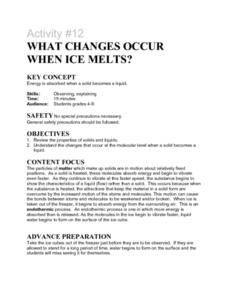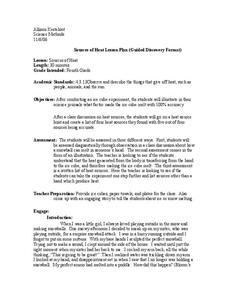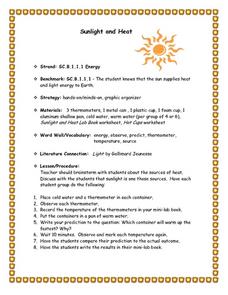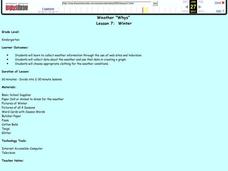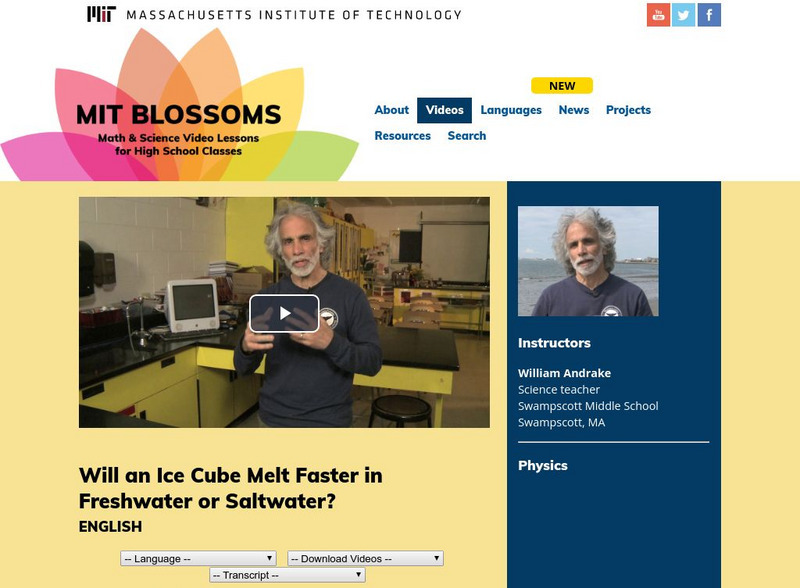Curated OER
Why Do Ice Cubes Melt?
First graders investigate water properties by participating in a hands on experiment. In this ice formation lesson, 1st graders examine real ice cubes in a bowl and identify the reasons why certain cubes melt faster than others. Students...
Curated OER
"I'm Melting!"
Third and fourth graders engage with a worksheet designed to help them differentiate between melting and dissolving. After reading an informative paragraph about the two actions, they consider four scenarios, and choose whether they...
Columbus City Schools
To Measure its Mass or Volume?
Atoms, elements, and molecules, oh my! Teaching the fundamentals of chemistry to curious sixth graders has never been easier to accomplish. Here is a resource that pulls together everything needed to get them off to a good start,...
Curated OER
The Day After Tomorrow: How is the Density of Water Related to Climate Change and Global Warming?
Science learners simulate what happens when ice breaks up and floats on water and how increased pressure on ice causes it to melt faster. They view a clip from the movie, The Day After Tomorrow, and relate their lab activities to what...
Curated OER
What Changes Occur When Ice Melts?
Students explore the physical process of melting. They observe melting ice and answer questions related to energy transfer during phase changes.
Curated OER
Physical Properties of Ice
Students explore the different properties of ice. They make predictions and experment with ice. Students discover that ice melts faster under pressure. Students create a flipbook what what happened after each experiment. This...
Curated OER
Sources of Heat
Fourth graders conduct an experiment related to heat sources, and participate in a heat source hunt. They identify sources of heat, then compare the melting rate of ice cubes, illustrating the results in their science journal. Students...
Curated OER
Ice Breakers: A Lab Experience About the Effects of Global Warming on Icecaps
Students describe the physical properties of ice and speculates on the dangers that icecaps might pose on a global scale. They then demonstrate, through a series of experiments, several physical properties of ice (ability to fracture,...
Center for Learning in Action
Water – Changing States (Part 2)
Here is part two of a two-part lesson plan in which scholars investigate the changing states of water—liquid, solid, and gas—and how energy from heat changes its molecules. With grand conversation, two demonstrations, and one...
Curated OER
Learning Lesson: That Sinking Feeling
Students discover the origin of the Great Ocean Conveyor. They participate in a demonstration showing how salinity and temperature affect water density. They also examine the new sea ice that forms every winter.
Curated OER
Sunlight and Heat
Students brainstorm about the sources of heat. They discuss that sunlight is one of those sources. Students complete a lab about cold water and warm water. They record the temperatures from each thermometer and discuss which container...
SFPOnline
States of Matter Worksheet
Young scientists get to the heart of the matter as they complete this worksheet on the properties of solids, liquids, and gases.
Curated OER
Phase Changes
In this phase change worksheet, students read about the particles in substances that speed up and slow down for substances to change phases. They answer eight questions about phase changes, the states of matter and how changing...
Curated OER
Conduction, Convection and Radiation
Sixth graders listen to descriptions of types of heat to gain background knowledge In this heat lesson, 6th graders perform experiments to understand various types of heat transfer (convection, conduction and radiation.) Students assess...
Curated OER
Weather "Whys"
Students explore the weather. In this weather data lesson, students collect weather data from Internet and media sources. Students graph the collected data discuss it as well as the seasons of the year.
Massachusetts Institute of Technology
Mit: Blossoms: Will an Ice Cube Melt Faster in Freshwater or Saltwater?
Engage learners in the study of the ocean and saltwater with these activities. Students will see that saltwater has different physical properties than freshwater - mainly density. This lesson can serve as a springboard into other...






